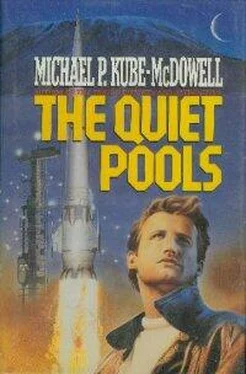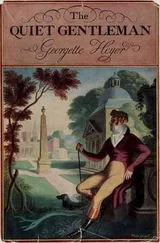Dryke snorted. “Julian Minor is an idiot. No. None at all.”
“One final question: Do we know for certain that Mr. Silverman knew Ms. Graham’s involvement with the Project?”
“He knew,” said Dryke.
“Are you basing that on his word alone?”
“No. On the fact that he was boasting about it when the Rangers picked him up. If he didn’t know before he left the bar with the woman, then she either told him or gave herself away somehow.”
“Thank you, Mr. Dryke, on behalf of the committee,” said Sasaki. “I know that this has been a long day for you. If you will allow me, I would like to close one other matter. Has there been any change in the status of the open gateway at the Munich operation?”
“No change,” said Dryke dourly. “There’ve been a fistful of attempted penetrations, but all amateurs. It looks like the big fish saw the hook.”
“I am told by Mr. Reid that it is through the exercise of discretion that they live to become ‘big fish,’ ” said Sasaki. “Please have the gateway closed and the operation terminated. The staff will require the navigation package to be available when they begin reporting after the New Year, and any further delays in its installation will endanger that.”
“Yes, Director.”
“We will contact you in the morning if we have further questions—please notify me immediately if there are new developments.”
“Of course.”
Sasaki touched her slate, and the Houston link was broken. There was a prolonged silence, more subdued than respectful, in the garden room in Prainha.
“Mr. Tidwell,” said Sasaki at last, frowning. “Are you there?”
“Yes,” came the reply, ferried across the Atlantic by the sky-link. “Yes, I am.”
“Do you have anything to add?”
Tidwell’s eyes were dull, and the words came slowly. “I was fond of Miss Graham. I deeply—regret—her death. That said, I do not see what I can contribute to this discussion.”
One of the men across from Sasaki stirred. “Can I ask what he was doing in Houston in the first place?”
“Mr. Tidwell?” asked Sasaki. “Did you hear that?”
“I had—made a judgment—that in order to truly know the colonists, I would have to share their lives—their experience.” He paused. “I meant to leave in three days, when the class was released.”
“Does sharing their lives include dating twenty-year-old girls?” The question came from a woman sitting to Sasaki’s left.
“I am satisfied that Mr. Tidwell’s involvement in these horrible events is tangential and entirely incidental. Further, that his involvement with Miss Graham was consistent with the purposes he named,” said Sasaki, her tone a sharp rebuke. “I have asked for his observations because he is in a position to speak to the present atmosphere in Houston, and for no other reason.”
The woman lowered her eyes and was silent.
“While in Houston, I saw a marked and growing polarization,” said Tidwell, stepping into the empty space. “Lines of allegiance have hardened. You hear bitter words on both sides, little communication between them. Emotions have outdistanced reason in too many minds. I am forced to say that I am not surprised that this happened. It was an undeclared war. No longer.”
“Can you plot the curve?” asked the woman.
“Pardon me?”
“How long will the Houston operation be sustainable?” she asked. “Will we be able to move three more classes through by March?”
“I see,” said Tidwell. “I am not well versed in the business of prediction.”
“Noted,” Sasaki said. “I would appreciate your assessment, all the same.”
Tidwell loosed an uncomfortable sigh. “The undeclared war was fought, I might argue, by gentleman’s rules. If Evan Silverman presages a new group of players who recognize no rules, it seems to me that it will be a near thing. There are wolves at the door.”
“Thank you, Thomas,” said Sasaki. “You may leave us now.”
“May I ask a question of my own?”
“Of course.”
“Why is Malena Graham so important? I was told today that twenty-nine people attached to the Project have died in accidents and other incidents this year, including three colonists. At least six of those deaths were murders. I am not aware that the committee was convened on the occasion of each or any of those cases. I’m beginning to wonder if you’re not more concerned about my involvement than you’ve admitted.”
Sasaki briefly showed a tired smile. “You have answered your own question, Thomas. Malena Graham is so important because she demonstrates that the rules have changed. She is the first colonist killed simply because she was a colonist.”
“But what does that mean to you?” Tidwell said. “I half believe that you’ve been watching for it to happen.”
“We have been watching for certain signs,” said Sasaki. “Some time ago, the sociometric unit prepared a study of the rising curve of opposition to the Diaspora. It contained a multi-stranded prediction, specifying several checkpoints and watershed events. Malena’s murder and your assessment of the situation in Houston both fit the projection.”
“Why was this study kept from me?” asked Tidwell.
Sasaki showed a flash of annoyance. “As you said yourself, your province is the past, not the future. It was not kept from you. It was simply not relevant to your work.”
“I would like to have made that judgment myself,” said Tidwell, somewhat chastened. “In any case, I now understand your concern.”
“Our concern is long-standing.” She gestured with her right hand, her simple metal bracelet gleaming. “To date, all is as predicted—the changing political and social climate, the drop in options and acceptances, and now the violence.”
Tidwell’s expression was a troubled one. “What lies at the end of the curve? What does this mean for Knossos?”
Sasaki was slow to respond, and it seemed to those in the room with her at Prainha that it was less for lack of an answer than for her reluctance to voice it.
“I suppose that circumstance has now made the study relevant to your office,” she said at last. “If the projection continues to hold, we will never build Knossos .”
“What!”
“Or Mohenjo-Daro , or Teotihuacán ,” Sasaki continued. “The Diaspora will end with Memphis. That , Mr. Tidwell, is why Malena Graham is so important.”
“Then I will hope that fortune-telling is a less exact science than history,” Tidwell said. “Good night, Director.”
“May I ask him one more question?” It was the woman to Sasaki’s right.
Sasaki gestured her assent.
“This boy you were talking to that night—the archie you left Malena for. Did you learn anything from him?”
Eyes haunted, Tidwell slowly shook his head. “That cuts the deepest,” he said. “There was nothing he could tell me, because he didn’t know himself.”
When Tidwell was gone, there was an uneasy silence in the garden room. Sasaki rose wordlessly and crossed the room to the dispenser for a cup of Japanese tea. One of the men stood at the window-wall at the far end of the room, looking out at the lights of the spaceport.
“That’s it, then,” he said finally. “We’ve crossed a threshold.”
No one spoke.
“I’m surprised you told Dr. Tidwell as much as you did,” said the woman when Sasaki rejoined them.
“It was time for him to know.”
“But not the whole story.”
“He is my barometer,” she said. “He now knows as much as he needs.”
“I don’t think you should have soft-pedaled it,” said the man at the window, returning to his chair. “The truth is, we’ll be lucky if they don’t find a way to stop Memphis.”
Читать дальше

![Nick Cracknell - The Quiet Apocalypse [= Island Zero]](/books/28041/nick-cracknell-the-quiet-apocalypse-island-zero-thumb.webp)










